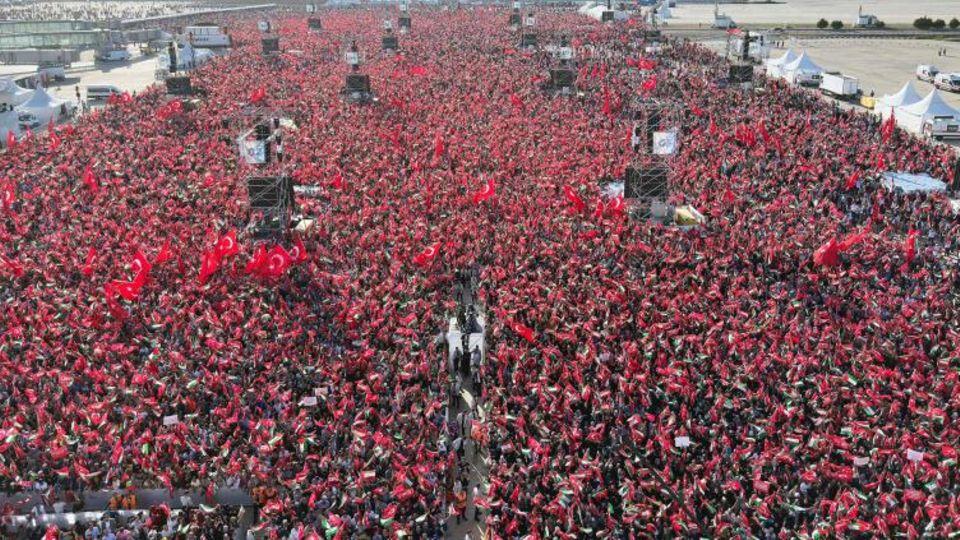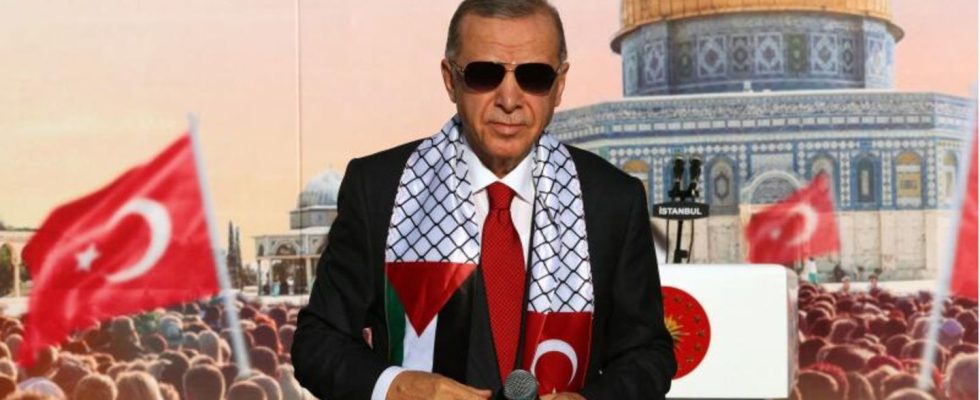They raped, kidnapped and murdered civilians. The president of a NATO member state calls them “freedom fighters.” There is no longer any sign of Turkish President Recep Tayyip Erdoğan’s level-headedness at the start of the war in the Middle East. Why?
The day before Turkey celebrates its 100th birthday, its president stands on a stage and glosses over terrorism. And hundreds of thousands cheer.
Shouts of “Allahu Akbar” can be heard again and again from the sea of people on the grounds of the disused Istanbul airport, named after the founder of the state, Kemal Ataturk. Countless people are waving lots of Turkish and lots of Palestinian flags. The man who paces up and down the massive stage flanked by four huge monitors also shows his colors. Recep Tayyip Erdoğan has a silk scarf wrapped around his shoulders, the Turkish flag at one end and the Palestinian flag at the other end. A few hours earlier, “in view of Israeli oppression,” he had invited “all my brothers and sisters” to a pro-Palestinian rally.
His 45-minute speech, broadcast live on the Internet, was intended to be a message of peace. In the end, it’s little about peace and a lot about guilt. Hamas? freedom fighter. Israel? War criminal. The West? The responsible.
Shortly afterwards, Israel withdraws all diplomats from Turkey. A “reassessment of relations” will be carried out, writes Secretary of State Eli Cohen on X. However, most Israelis had long since left the country – out of fear. The National Security Council in Jerusalem had issued a travel warning for Turkey.

Thousands upon thousands turned out for the pro-Palestinian rally on Saturday at the site of the disused Ataturk Airport in Istanbul
© Turkish Presidency press office / AFP
With Erdoǧan’s angry speech, Turkish-Israeli relations have reached a new, sad low. At the beginning of this war, the Turkish president held back; experts even cautiously attested to him having a potential role as a mediator. The federal government also hoped Ankara as mediator. The AKP leader’s level-headedness did not last long.
Recep Tayyip Erdoǧan’s about-face – solidarity with Hamas
When the radical Islamic Hamas began its slaughter on October 7th, Erdogan surprisingly first discovered his inner Switzerland and called on both sides to de-escalate. People in his party were less cautious. AKP official Süleyman Sezen declared at a party event that he “curses Israel”, hopes for an early end to “this terrorist state” and was even not above the following sentence: “I pray to God that he gives Hitler grace and mercy. ”
Less than three weeks later, Erdoǧan also made a U-turn: On Wednesday, Erdoǧan described Hamas to party sympathizers in Ankara as a resistance group that was only fighting “to protect its country and its people.” He left unmentioned that these “freedom fighters” had murdered more than 1,400 Israelis in a heinous manner and abducted more than 200 people. Turkey, he said, owes Israel “nothing” – in contrast to the West.
He also ignores the fact that Turkey, as a NATO member, is actually part of “the West”. Of course, it is not the first time that Erdogan has given the occasional Wessi. The AKP leader has always interpreted Turkey’s role in the military alliance in a very idiosyncratic way and likes to use the right of veto as a means of pressure – for example when he opposed the planned addition to the family through Finland and Sweden.
In fact, Erdogan’s brief bout of neutrality was a deviation from the norm, not the other way around. He had previously described Hamas as a “resistance movement,” called Israel a “terrorist state,” and fueled anti-Semitic clichés. For example, he once claimed that Jewish US billionaire George Soros was working to “divide and destroy the Turkish nation.” That summer he received Mahmoud Abbas, the increasingly powerless president of the Palestine Liberation Organization, and Hamas leader Ismail Haniyye.
Only three percent of Turks are in favor of supporting Israel
There has been virtual silence between Jerusalem and Ankara since 2010, after nine Turks died while trying to deliver aid to the Gaza Strip by ship. Hamas, unsurprisingly, particularly benefited from the breakdown of the relationship. During this time they opened the first offices in Turkey. Their leaders, some of whom the USA has placed millions of dollars in bounties on, can travel in and out easily.
Region in turmoil
Who is on whose side in the Middle East?
The icy diplomatic climate between the two countries has recently thawed – Erdogan received Israel’s President Isaac Herzog last year and even invited Prime Minister Benjamin Netanyahu to his place. But now “Bibi’s” visit is definitely off the table.
When more than 200 people died last week when a rocket hit Al-Ahli Hospital in Gaza City, Turkey – like almost everywhere else in the Muslim world – quickly singled out Israel as the culprit. Erdogan ordered three days of national mourning. No flag flew at half-mast for the victims of Hamas.
In contrast to most Western countries, there is no fundamental goodwill towards Israel in Turkey. Many Turks, regardless of their political orientation, see the Jewish state primarily as an occupier, an oppressor of Muslims. The latest escalation further fuels the antipathy. According to the Turkish opinion research institute “Metropoll”. One in three Turks is in favor of a neutral stance – only about one in four would like to see Turkey play a mediating role. Only three percent are clearly in favor of supporting Israel. The fact that Hamas is not Palestine and the Israeli government is not the same as Israel obviously lacks this distinction here too.
Joining forces with Hamas: the result of a cost-benefit analysis
Erdoħan’s initial reluctance also caused Ankara to shake its head. Former Prime Minister Ahmet Davutoglu criticized what he saw as Erdogan’s weak reaction, and the spectrum of left-wing parties followed suit.
Pressure also came from our own corner, for example from the Kurdish, Hezbollah-affiliated party Hüda Par. Since the elections in May, four MPs have sat at Erdoǧan’s table. The party calls for complete secession from Jerusalem – economically, militarily and diplomatically. Erdoħan’s most important ally Devlet Bahçeli, the right-wing extremist leader of the largest coalition party MHP, also took a much more rigorous stance from the start. He gave Israel a 24-hour deadline to stop bombing the Gaza Strip – otherwise Turkey would have to “do everything that its historical, humanitarian and religious responsibility requires.” The longer Erdoħan stayed on his experimental, moderate course, the more time the competition had to stage itself.
According to experts, Erdoǧan’s initial hesitation may also have economic reasons. Siding with Hamas could scare away foreign investors. And Turkey needs that. The country’s economic situation remains poor despite a gradual upswing. The lira’s decline had eased in the meantime, but inflation recently shot up again was around 59 percent in September.
Thousands of victims
War in the Middle East: Deaths and Mourning in Israel and Gaza
Personal resentment or not, Erdogan’s course correction is ultimately an expression of sheer opportunism. As an arbitrator, he could have briefly shone in foreign policy. But he would have lost with his core voters. Apart from that, more influential intermediaries have come to the fore. When in doubt, the Hamas leadership is more likely to listen to its donors from Qatar and the Netanyahu government is more likely to listen to its comparatively reliable neighbor Egypt.
What remains for Erdoǧan is a cost-benefit calculation. And according to them, joining forces with terrorists is simply more worthwhile.
Sources: “Mirror“, “Editorial network Germany“; “Arab Center for Research and Policy Studies“; “Foreign policy“; “Al Monitor“; “Council on Foreign Relations“; DPA; AFP

